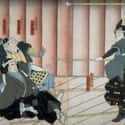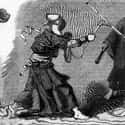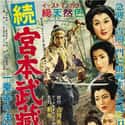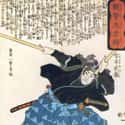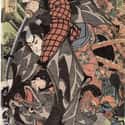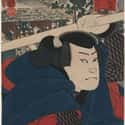-
(#2) He Was Undefeated In 60 Duels
Duels in early 17th-century Japan were often fatal. Miyamoto Musashi spent a large portion of his life traveling across Japan engaging in duels, slaughtering many master duelists along the way. Through this campaign of continual combat, Musashi perfected his skills and rose to become the greatest swordsman in Japanese history.
Not only did Musashi risk his life during his various duels, he also served in several battles. He wrote in A Book of Five Rings,
"Generally speaking, the Way of the warrior is resolute acceptance of death.
In my strategy, the training for killing enemies is by way of many contests, fighting for survival, discovering the meaning of life and death, learning the Way of the sword, judging the strength of attacks and understanding the Way of the 'edge and ridge' of the sword."
-
(#8) He Fought Against – And Defeated – Masters Of Every Weapon
Musashi didn't just fight swordsmen in duels; he purposefully sought out masters of every weapon. In 1607, he sought out an undefeated master of the kusarigama (sickle and chain) named Shishido Baiken. According to legend, Baiken struck first with the chain, dulling and bending Musashi's blade. As the two drew close to one another, Musashi pulled out his short sword, usually only used in ritual suicide. Baiken hesitated, providing Musashi with the opportunity to drive the short sword into Baiken. With his last breath Baiken whispered, "Thank you."
Later that same year, Musashi defeated Muso Gonnosuke who was a master of jojutsu (a short staff technique). At the time, Gonnosuke had allegedly never lost a duel. Since the two agreed to battle with wooden swords, Gonnosuke survived, despite his defeat. Gonnosuke spent years training for a rematch, only for Musashi to win again.
In A Book of Five Rings, Musashi wrote, "You should not have a favorite weapon. To become over-familiar with one weapon is as much a fault as not knowing it sufficiently well."
-
(#1) He Beheaded A 12-Year-Old Challenger
After Musashi defeated the esteemed Yoshioka brothers, who ran a venerable kenjutsu school, the rest of the clan was infuriated. They hatched a plot that involved the new head of the clan, a 12-year-old named Matashichiro, challenging Musashi to a duel, at which the clan would ambush Musashi.
When Musashi was challenged to a night duel, he immediately became suspicious. He arrived early on the night of the duel and hid in the bushes. Sure enough, Matashichiro arrived with a retinue of battle-ready soldiers. Musashi ran out of the bush screaming, slashing off Matashichiro's head with his sword. Surrounded and outnumbered, he unsheathed a second weapon and began his defense. Despite the odds, Musashi fought his way out of the scrum. This moment is alleged to be the origin of Musashi's two-sword technique.
In A Book of Five Rings, Musashi wrote,
"The principle is 'strategy by means of the long sword'. If he attains the virtue of the long sword, one man can beat ten men. Just as one man can beat ten, so a hundred men can beat a thousand, and a thousand men can beat ten thousand. In my strategy, one man is the same as ten thousand, so this strategy is the complete warrior's craft."
-
(#5) At Age 21, He Defeated Two Sword Masters In Quick Succession
When Musashi Musashi arrived in Kyoto in 1604, he was unknown; he was determined, however, to make a name for himself. To do so, he challenged Yoshioka Seijuro of the Yoshioka Clan to a duel.
The Yoshioka clan were swordfighting teachers who had tutored members of the powerful Ashikaga clan for four generations, running one of the eight great sword schools in Kyoto. They taught using the Yoshioka Ryu style. Musashi might not have even secured a duel with them were it not for his father's reputation as a skilled swordsman.
On the morning of the duel, Musashi purposefully arrived late to anger his opponent. This strategy proved successful – Musashi won handily, breaking Seijuro's arm with his bokuto. Seijuro was so dishonored, he quit swordsmanship and became a Zen monk.
Seijuro's brother, Yoshioka Denshichiro, challenged Musashi to a duel to restore his clan's honor; as such, the duel was to be fatal. Again, Musashi arrived late. Using a bokuto, he ended Denshichiro with a single blow to the head.
-
(#9) He Spent Years Wandering As A Shugyosha
When Musashi was a teenager, he left his hometown to trek around Japan. His samurai journey, called musha shugyō, saw him wandering the wilderness training, dueling those he could challenge, and living a taxing, minimalist lifestyle. Becoming a homeless vagrant was a common way to develop a name for yourself as a samurai, and often landed warriors employment. Life as a shugyosha wasn't easy, but it helped Musashi become a fierce warrior.
In A Book of Five Rings, Musashi wrote, “Do not sleep under a roof. Carry no money or food. Go alone to places frightening to the common brand of men. Become a criminal of purpose. Be put in jail, and extricate yourself by your own wisdom.”
-
(#14) He Left Home At A Young Age To Live With His Uncle, A Buddhist Monk
In 1584, Shinmen Musashi was born in Miyamoto village to a samurai family. His mother perished during childbirth, and his father, Shinmen Munisai, was an expert swordsman and served as Musashi's first teacher. Munisai was harsh and strict, especially toward his young son.
When Musashi was either nine or ten, he went to live with his uncle. Some accounts claim his father abandoned him, while others say he was killed in a duel. Some think Musashi simply ran away. In any case, Musashi took little else from his father but his name and the basic techniques of the samurai.
Musashi's uncle Dorin was a monk from the Shoreian temple in Miyamoto. At the temple, Musashi learned Zen Buddhism, reading, and writing. He continued to hone his swordsmanship until he left the temple to become a shugyosha (wandering samurai in training) at some point between the ages of 16 and 20.
New Random Displays Display All By Ranking
About This Tool
The identity of a Japanese samurai is a hereditary heritage, not a profession. Some samurais are also very prestigious scholars, and they can also serve as civil and military administrators, clergy, painters, and aestheticians. There were many famous samurai in history, the greatest should be Musashi Miyamoto. He was a famous swordsman at the end of the Sengoku period in Japan and became famous for his superb swordsmanship and achievements.
Miyamoto Musashi lived in a turbulent historical period, but he devoted himself to the study of warfare and swordsmanship and made great achievements. The random tool shares 14 facts about the violent life of this greatest samurai.
Our data comes from Ranker, If you want to participate in the ranking of items displayed on this page, please click here.











